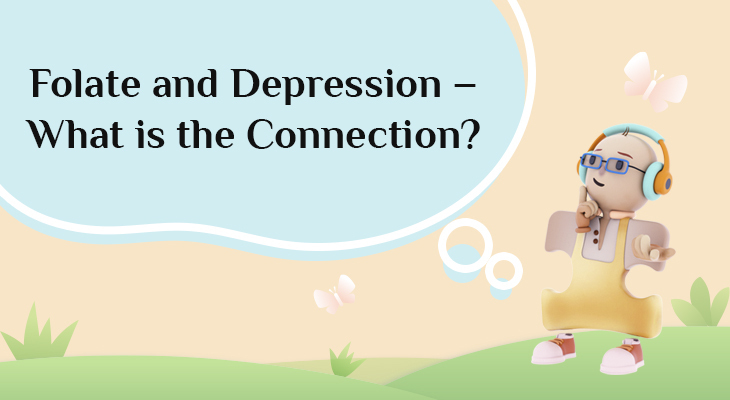
Folate and Depression
Depression is a complex mental health disorder influenced by genetic, biochemical, and environmental factors. Among the lesser known but critically important contributors is folate (vitamin B9) deficiency. Folate plays a fundamental role in brain function, neurotransmitter synthesis, and DNA methylation—processes that directly impact mood regulation. When folate levels are insufficient, biochemical disruptions occur, increasing susceptibility to depression.
Folate (vitamin B9) is one of the most important nutrients for mental health, acting as a key regulator of mood, brain function, and emotional resilience. Its deficiency is strongly linked to depression, and ensuring adequate levels can help prevent and even treat depressive symptoms.
Folate has a major role in neurotransmitter production influencing serotonin, dopamine, and norepinephrine synthesis.
Basically, this critical vitamin is essential for producing and maintaining the proper function of mood-stabilizing neurotransmitters such as:
- Serotonin → Regulates happiness, sleep, and appetite.
- Dopamine → Controls motivation, pleasure, and focus.
- Norepinephrine → Influences energy and stress response.
Folate (as 5-MTHF – which is a reduced folate) supports SAMe (S-adenosylmethionine), the body’s primary methyl donor needed to make these neurotransmitters. If there is low folate, then this may lead to low SAMe and reduced serotonin/dopamine, which ultimately may lead to a higher depression risk. In this context, folate helps convert homocysteine (a toxic amino acid) into methionine, which then forms SAMe.
Folate deficiency leads to a buildup of homocysteine, thereby increasing brain inflammation, oxidative stress, and neuronal damage. This cascade of connected mechanisms can lead to increased depression risk.
One potential pathway leading to folate deficiency (or insufficiency) is tied to folate and genetic vulnerability in connection to MTHFR mutations/polymorphisms. It is thought that approximately 30-40% of people have a mutation in the MTHFR gene, reducing their ability to convert folate into its active form (5-MTHF). In these circumstances, folate may not be readily available to penetrate the brain, thereby resulting in a compromise of proper working neurons, leading to an increased risk of depression. In essence, this would be the connection between lower 5-MTHF and less SAMe, resulting in poor neurotransmitter production.
Another contributing factor linked to an increase in depression risk relates to folate deficiency and the role of folate’s anti-inflammatory and neuroprotective effects.
Folate is known to reduce brain inflammation, and depression has been increasingly linked to chronic neuroinflammation.
Folate helps lower inflammatory cytokines (IL-6, TNF-α), which are often elevated in depressed individuals. Folate deficiency also increases free radical damage in the brain.
Adequate folate preserves neurons, supports mitochondrial function (energy production in brain cells), and contributes to neuroplasticity. Folate is needed for DNA methylation, which regulates genes involved in:
- BDNF (Brain-Derived Neurotrophic Factor) → Essential for neuron growth and resilience.
- Stress response pathways → Helps the brain adapt to emotional challenges.
Folate Receptor Autoantibodies and Depression
Another potential contributor to folate deficiency which may increase the risk for depression is the presence of folate receptor autoantibodies (FRAAs). Folate receptor autoantibodies (FRAAs) – both blocking or binding types attack FRα, disrupting folate transport into the brain, leading to low cerebrospinal fluid (CSF) 5-MTHF despite normal blood folate levels. This results in cerebral folate deficiency syndrome (CFDS), which is linked to neuropsychiatric symptoms, including depression. Some studies have reported elevated FRAs in major depressive disorder (MDD) patients compared to controls.
Low folate levels have been a known risk factor for depression and poor antidepressant response.
Testing with FRAT®
FRAs can be measured in blood, and if positive it is suspected that CSF 5-MTHF may be low. In such cases, treatment has been available with the administration of folinic acid or Methylfolate. The goal with this type of treatment is to restore folate levels in the brain.
FRAs contribute to depression by inducing cerebral folate deficiency, disrupting neurotransmitter balance, and increasing neurotoxic metabolites. Screening for FRAs with the FRAT® test, in treatment-resistant depression may identify patients who benefit from folate-based therapies.
As with any medical condition, a physician’s consultation, authorization, and guidance is required.
Folate is a Powerful Depression Shield
Folate is not just a vitamin—it’s a critical regulator of brain chemistry, inflammation, and stress resilience. Folate contributes by:
- Boosting serotonin and dopamine
- Lowering homocysteine and inflammation
- Protecting neurons from damage
- Overcoming genetic weaknesses (MTHFR)
Ensuring optimal folate levels can be one of the most effective ways to prevent and combat depression naturally.
Research references:
- Low folate levels predict depression (Morris et al., 2003).
- Folate supplementation improves antidepressant effectiveness (Papakostas et al., 2012).
- High homocysteine (due to low folate) increases depression risk by 2x (Bjelland et al., 2003).



